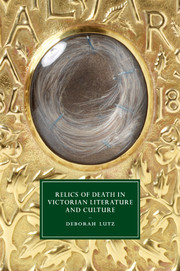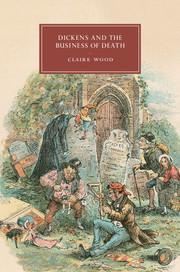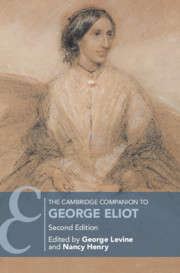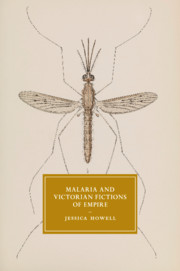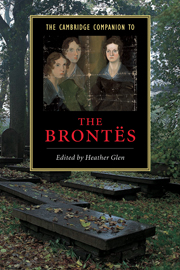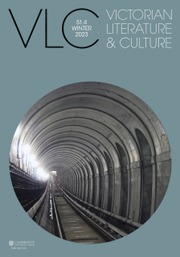Relics of Death in Victorian Literature and Culture
$31.99 (C)
Part of Cambridge Studies in Nineteenth-Century Literature and Culture
- Author: Deborah Lutz, Long Island University, New York
- Date Published: July 2017
- availability: Available
- format: Paperback
- isbn: 9781107434394
$
31.99
(C)
Paperback
Other available formats:
Hardback, eBook
Looking for an examination copy?
If you are interested in the title for your course we can consider offering an examination copy. To register your interest please contact collegesales@cambridge.org providing details of the course you are teaching.
-
Nineteenth-century Britons treasured objects of daily life that had once belonged to their dead. The love of these keepsakes, which included hair, teeth, and other remains, speaks of an intimacy with the body and death, a way of understanding absence through its materials, which is less widely felt today. Deborah Lutz analyzes relic culture as an affirmation that objects held memories and told stories. These practices show a belief in keeping death vitally intertwined with life - not as memento mori but rather as respecting the singularity of unique beings. In a consumer culture in full swing by the 1850s, keepsakes of loved ones stood out as non-reproducible, authentic things whose value was purely personal. Through close reading of the works of Charles Dickens, Emily Brontë, Alfred Lord Tennyson, Thomas Hardy, and others, this study illuminates the treasuring of objects that had belonged to or touched the dead.
Read more- Explores the material nature of attitudes toward death in Victorian Britain
- Analyses the collecting and revering of relics as affirmations that objects held memories and told stories
- Sheds new light on the work and thought of canonical writers, including Brontë, Dickens, Tennyson and Hardy
Reviews & endorsements
'… Lutz's study invites us to re-consider the centrality of grief and the persistence of mourning across nineteenth-century art and literature.' Michael J. Sullivan, Tennyson Research Bulletin
See more reviews'… Lutz supplies a fascinating discussion of the many ways besides lockets of hair that Victorians preserved parts of their loved ones’ corpses as relics. … Lutz reveals that death was an intimate part of life for Victorians - not ghastly and Other, as it is for us.' Sarah Gates, Dickens Studies Annual
Customer reviews
Not yet reviewed
Be the first to review
Review was not posted due to profanity
×Product details
- Date Published: July 2017
- format: Paperback
- isbn: 9781107434394
- length: 261 pages
- dimensions: 230 x 150 x 14 mm
- weight: 0.39kg
- contains: 16 b/w illus.
- availability: Available
Table of Contents
Introduction: lyrical matter
1. Infinite materiality: Keats, D. G. Rossetti and the Romantics
2. The miracle of ordinary things: Brontë and Wuthering Heights
3. The many faces of death masks: Dickens and Great Expectations
4. The elegy as shrine: Tennyson and 'In Memoriam'
5. Hair jewelry as congealed time: Hardy and Far from the Madding Crowd
Afterword: death as death
Bibliography.
Sorry, this resource is locked
Please register or sign in to request access. If you are having problems accessing these resources please email lecturers@cambridge.org
Register Sign in» Proceed
You are now leaving the Cambridge University Press website. Your eBook purchase and download will be completed by our partner www.ebooks.com. Please see the permission section of the www.ebooks.com catalogue page for details of the print & copy limits on our eBooks.
Continue ×Are you sure you want to delete your account?
This cannot be undone.
Thank you for your feedback which will help us improve our service.
If you requested a response, we will make sure to get back to you shortly.
×
